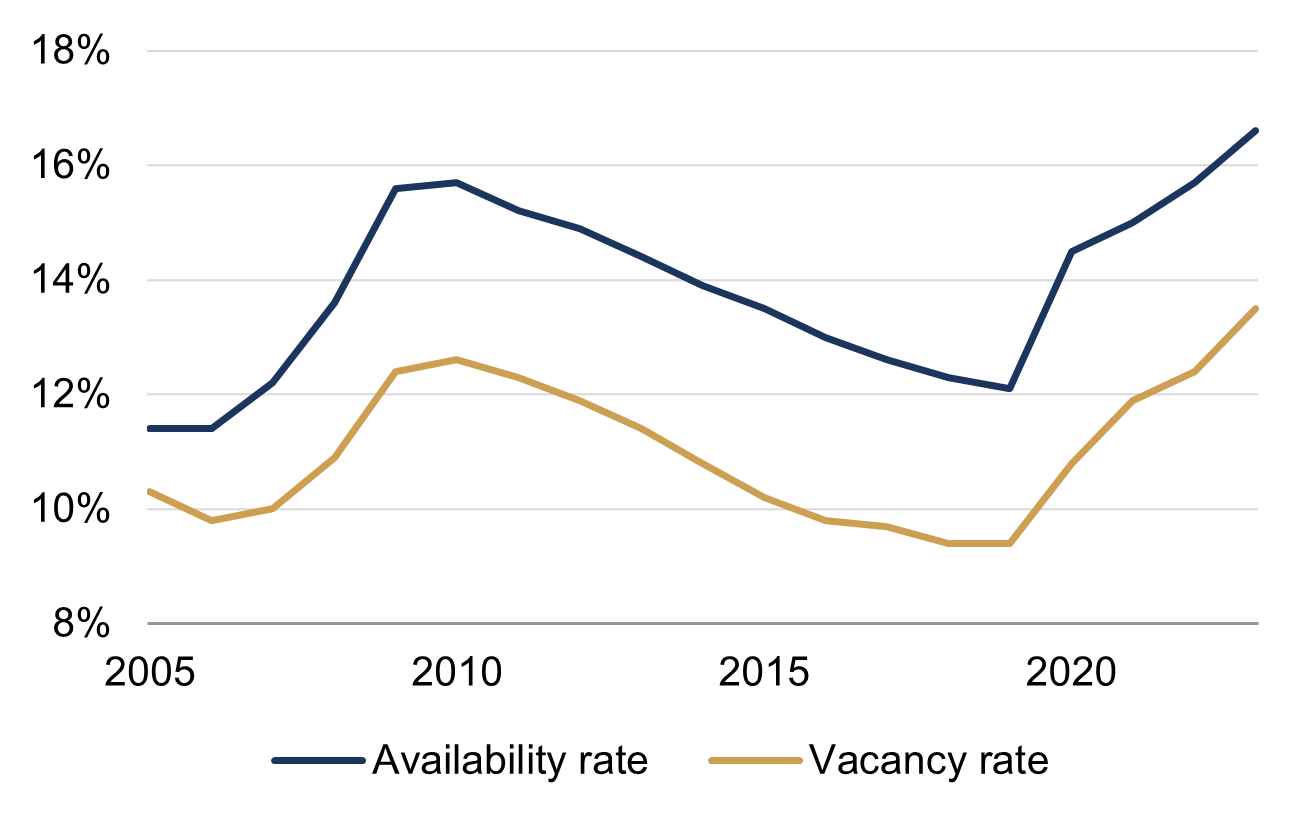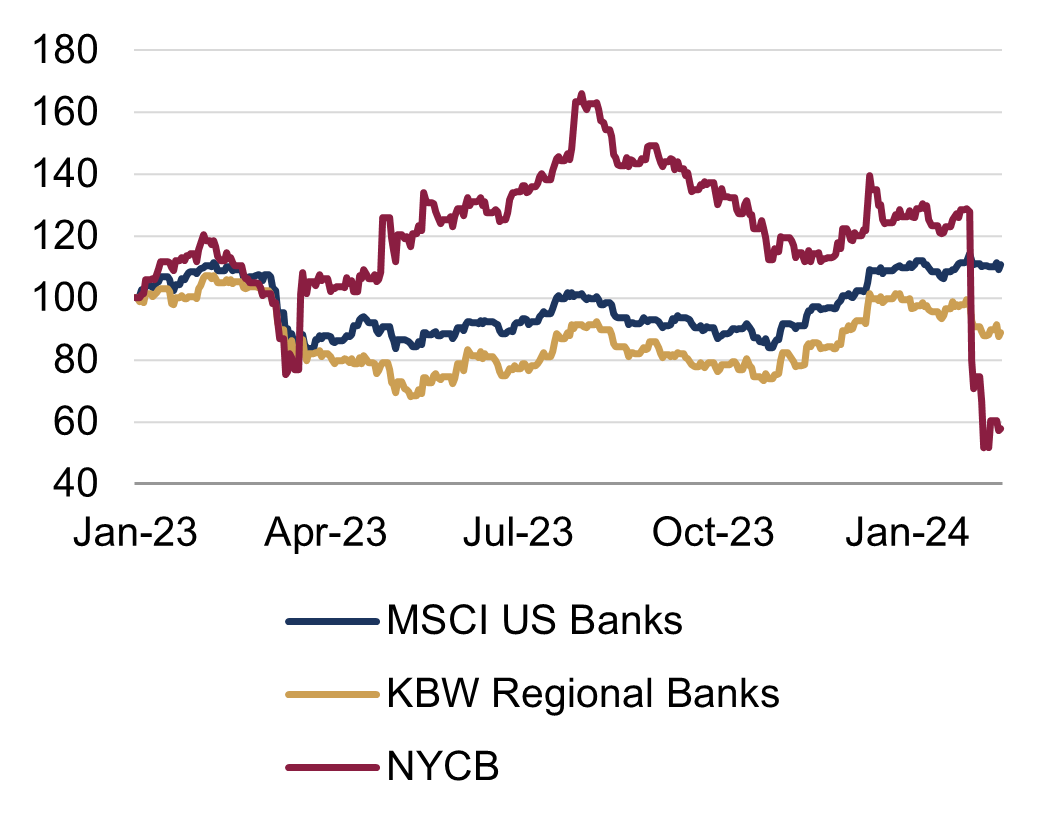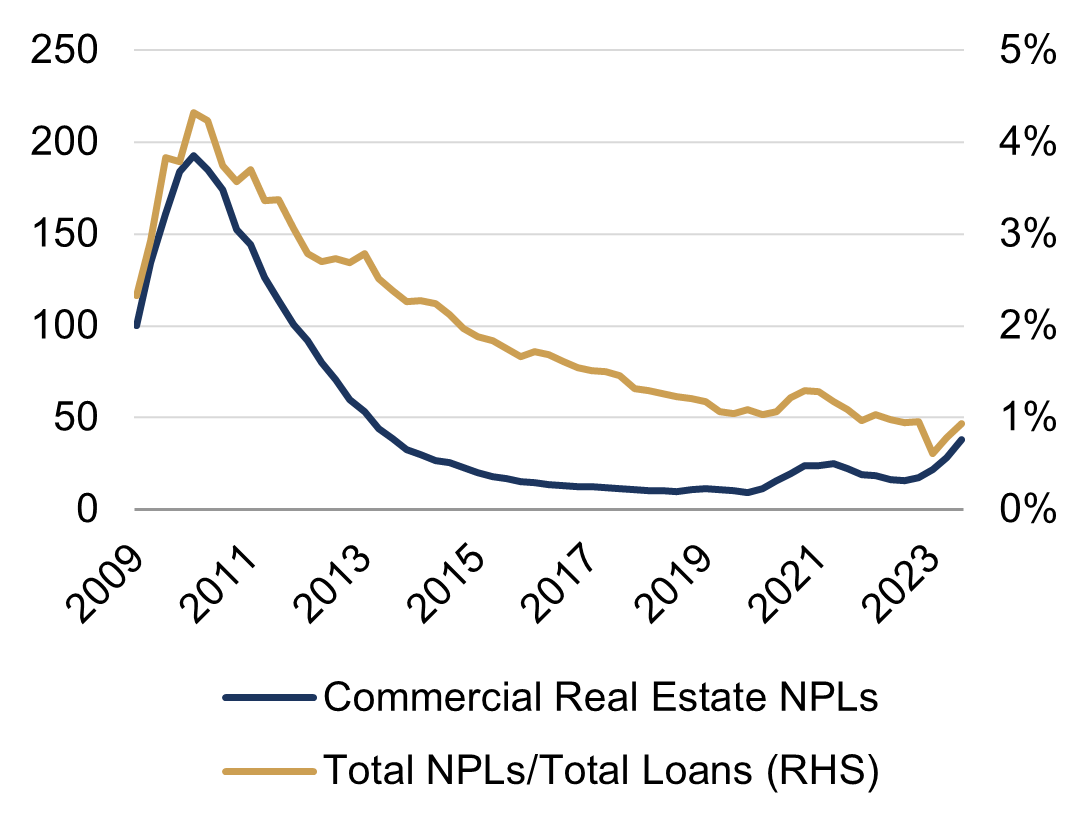Banks: still stressed?
It has been almost one year since banking stresses first emerged – and quickly dissipated – in the US. But that eerie silence has given way to renewed contagion concerns in recent weeks.
New York Community Bancorp (NYCB) saw its share price more than half in a matter of days, following its unexpectedly weak quarterly results. The bank cut its dividends sharply, but it was the increase in loan loss provisions related to commercial real estate (CRE) which caught the market's attention. Somewhat ironically, the bank has to raise capital to comply with stricter regulations following its acquisition of Signature Bank's assets in March 2023.
The sharp rise in interest rates has been a headwind for the fragmented real estate market. CRE consists of office, retail, industrial and multi-family residential (apartment) segments – but office CRE, in particular, has experienced a few difficult years. The transition to remote working in the post-pandemic world, along with the need for buildings to meet the latest environmental standards, has pushed vacancy and availability rates higher. US office space appears most vulnerable, with vacancy rates exceeding levels which were reached in the aftermath of the Global Financial Crisis (figure 1).
Figure 1: US office vacancy and availability rates
(%)

Source: Rothschild & Co, Fitch Ratings, CoStar Group
NYCB appears more exposed than most, with almost half its assets consisting of CRE loans. Smaller US banks generally have high exposure: office CRE loans account for 30% of these institutions' total assets, according to Federal Reserve data. Conversely, the larger banks' equivalent figure is closer to 6%.
The latest bout of banking stress has so far been modest compared to last year. The broader US regional banks index has declined by 'only' a tenth since NYCB's announcement, and is well above its lows from May last year (figure 2). Broader bank stress metrics – the major banks' credit default swaps and interbank market spreads – are not signalling any widespread difficulties.
Overall bank fundamentals have yet to meaningfully deteriorate. For instance, the banks' CRE-related non-performing loans (NPLs) are a fifth of their post-GFC high when adjusted by inflation, and NPLs relative to total loans remain subdued (figure 3) – the latter may not be too surprising given the resilience of the US economy. Most importantly, deposit flight has not occurred from the small US commercial banks, suggesting that confidence remains intact.
| Figure 2: US bank stocks
Rebased (Jan 2023 = 100, USD, total returns) |
Figure 3: US bank loans
LHS: rebased (Jan 2009 = 100), inflation-adjusted; RHS: % |
 |
 |
| Source: Rothschild & Co, Bloomberg | Source: Rothschild & Co, Bloomberg Note: Sample consists of 20 US banks from Bloomberg Intelligence’s banking dashboard. Data as of Q3 2023 |
Clearly, the risk of a financial accident is still high, particularly for those smaller banks with exposure to office CRE. NYCB is not 'too big to fail' – it was the 35th largest US bank by total assets as of Q3 2023 – but contagion and spillover effects remain a concern. The read across to other small banks – a sharp sell-off in Japan's Aozora Bank and Germany's Deutsche PBB – were a reminder of how quickly negative sentiment can spread. Concerns may also resurface when the Fed's Bank Term Funding Program, which was a major force in containing last year's stress, expires in March.
Still, a full-blown financial crisis seems unlikely – even if the situation were to escalate. The major banks at least are far better capitalised and more liquid than they were in the run up to the Global Financial Crisis, and bank lending (overall) does not appear reckless. The absence of widespread financial engineering also gives us further comfort.
Ready to begin your journey with us?
Speak to a Client Adviser in the UK or Switzerland
Past performance is not a guide to future performance and nothing in this article constitutes advice. Although the information and data herein are obtained from sources believed to be reliable, no representation or warranty, expressed or implied, is or will be made and, save in the case of fraud, no responsibility or liability is or will be accepted by Rothschild & Co Wealth Management UK Limited as to or in relation to the fairness, accuracy or completeness of this document or the information forming the basis of this document or for any reliance placed on this document by any person whatsoever. In particular, no representation or warranty is given as to the achievement or reasonableness of any future projections, targets, estimates or forecasts contained in this document. Furthermore, all opinions and data used in this document are subject to change without prior notice.





